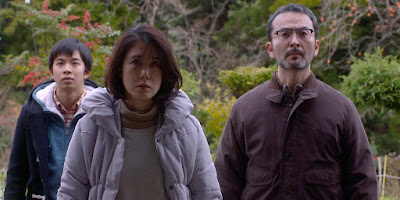A blog from me, Jeffrey Wang, about Asian film and culture, as well as discussions of films from throughout the world. I am an Asian-American filmmaker and writer. Please check out my books for sale at Amazon at this link: CLICK HERE
Friday, February 21, 2020
FILM REVIEW: HARMONIUM
Like the musical instrument that it references, Kōji Fukada’s Harmonium (2016) is methodical, meticulously constructed, and subtly disturbing. It reminds one of a Hitchcock thriller mixed with a hard boiled Sam Spade film noir. The less said about the plot specifics the better, as part of the enjoyment of viewing Harmonium is seeing how Fukada masterfully peels apart layers upon layers of the plot to uncover a deeply unsettling story.
Harmonium is about a seemingly normal Japanese family, consisting of a hard-working and stoic father (Toshio played by Kanji Furutachi), his wife (Akie played by Mariko Tsutsui), and their daughter (Hotaru played by Momone Shinokawa and Kana Mahiro). This three family unit live a quiet and mundane life until Toshio’s friend Yasaka (Tadanobu Asano) shows up, freshly released from prison. At first, Yasaka seems like a harmless and even gentle person, as he carefully ingratiates himself into Toshio’s family life. However, as Harmonium progresses, Fukada slowly shows how the family gets destroyed from Yasaka’s appearance.
On the surface, Harmonium is a domestic drama about a father and mother trying to protect their family from harmful, outside forces. But, Fukada is more interested in exploring how seemingly normal people such as Toshio are able to hide secrets about themselves from their closest loved ones. Without giving anything specific away, Toshio’s connections with his friend Yasaka’s criminal behavior are closely intertwined, and threaten to completely tear the central family unit apart.
The chain reaction of events that slowly destroys the family unravels in a slow, calculating manner, like an avalanche gaining force until it finally demolishes everything in its sight. The first half of Harmonium deals with Yasaka trying to gain the trust of Toshio’s wife and daughter, becoming an almost father figure of sorts to replace the cold and distant Toshio. A shocking event occurs midway through the film which causes Toshio to break out of his shell, and to take on a stronger role in the care of his wife and daughter. But, by that point it’s too late, as Fukada wants to show how Yasaka and Toshio are closer in nature than we first expect.
This ultimately is what Harmonium is about— the duplicitous nature of men who try to lead normal lives, while trying to hide disturbing truths about themselves from those they love. In this way, Harmonium is similar to Scorsese’s The Irishman, which is also about a man trying to reconcile his darker side with his duties to protect and love his family. Kanji Furutachi gives a chilling performance as Toshio, masterfully portraying how his stoic nature hides a deeper, more disturbing nature. As his wife, Mariko Tsutsui also gives a strong performance as a mother who will do anything to protect her daughter from both Yasaka and Toshio.
Harmonium gradually and inevitably leads to a genuinely shocking conclusion that confronts the viewer with questions about the true nature of the family unit. Fukada neatly connects an earlier image in the film of Toshio’s family happily lying by the lake with a more disturbing parallel image of the same family unit lying by the same lake later in the film, but in much more devastating circumstances. Like the best thrillers, Harmonium trusts its audience to patiently go along with its slow but steady flow, and asks us to look deeper into both ourselves and those around us to uncover deeper, darker truths about human nature.
Subscribe to:
Post Comments (Atom)






No comments:
Post a Comment